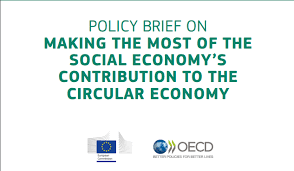Cooperatives help strengthen the circular economy, OECD/EU policy brief says
4 March 2022
A new policy brief by OECD/European Union discusses social economy’s contribution to the circular economy and highlights the important role of cooperatives.
Recently, the OECD and the European Union have published a Policy Brief on Making the Most of the Social Economy’s Contribution to the Circular Economy, looking at how various social economy actors – including cooperatives – contribute to the circular economy and calling for increased policy support.
The policy brief points out that social economy has pioneered circular practices and business models for decades and is particularly well-suited for achieving social and environmental goals. One of the key social economy values is primacy of people over capital. Social economy organisations, including cooperatives, benefit the society by re-investing profits for social or environmental purposes, even when these investments are less attractive from a purely financial perspective. Social economy helps make the green transition more inclusive by bringing it to remote and underprivileged areas, building local partnerships, promoting decent work, providing training and work for vulnerable groups, and making circular goods and services more affordable. Additionally, social economy organisations involve stakeholders in their decision-making, promote collaboration across value chains and among various types of actors, and help make green technologies more widely accepted in the population.
The document highlights the role that cooperatives play in bringing together various stakeholders in mutually beneficial circular value chains. It refers to cooperatives’ contribution to sustainable management of natural resources such as water, with thousands of water cooperatives in North America, Latin America and Europe. Cooperatives working in such sectors as circular construction, renewable energy, waste management, and electric car-sharing, and promoting social and labour-market integration of disadvantaged groups are also mentioned.
The policy brief recommends policy-makers to support cooperatives and other social economy entities active in the circular economy, in particular by encouraging innovation; offering improved access to finance and carrying out public procurement from social economy entities; promoting collaboration among social economy organisations, public actors and “traditional” businesses; and measuring the social, environmental and economic contributions of social economy actors (social impact) by gathering robust data. It also advises policies that promote the skilling of workers and decent work, and that use the expertise of social economy organisations which provide training and work integration.
Full report: OECD/European Union. Policy Brief on Making the Most of the Social Economy’s Contribution to the Circular Economy. Luxembourg: Publications Office of the European Union, 2022.

